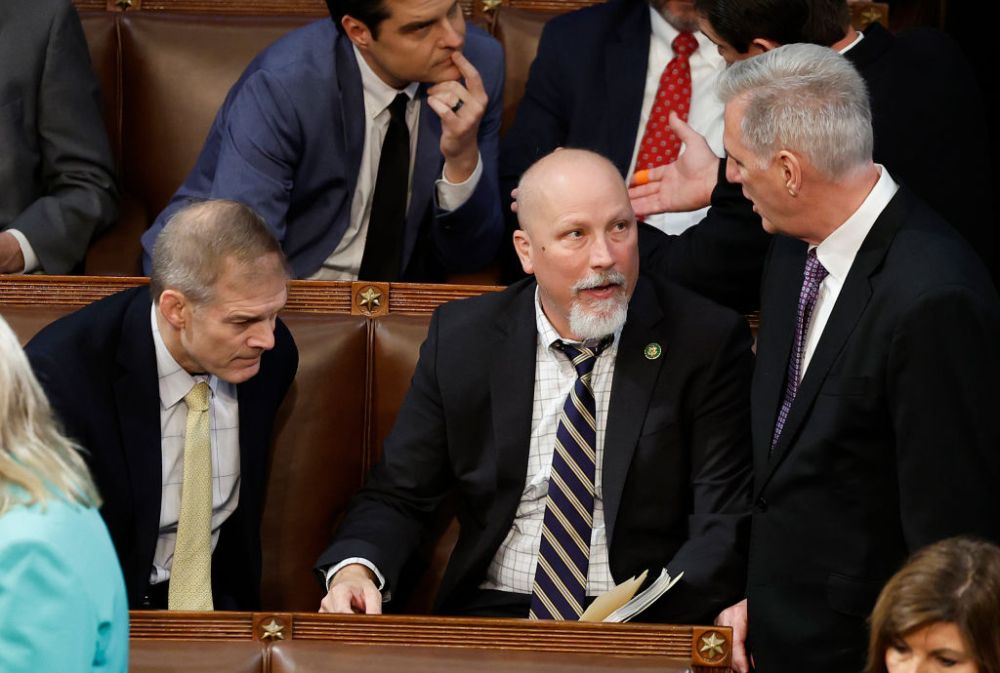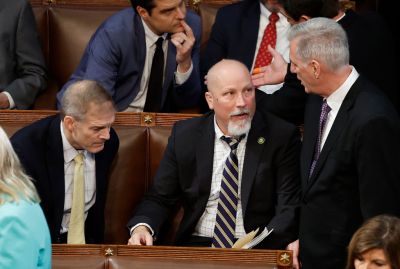Appetizer
Is bipartisanship cool again? Maybe.
Last week, Mitch McConnell and Joe Biden appeared together to tout infrastructure legislation that appropriated funds to fix the Brent Spence Bridge that spans the Ohio River between Cincinnati and Covington, Kentucky. Of course, the Joe Biden who ran for president in 2020 as a dealmaker sounded very different than the Joe Biden who said Republicans were in favor of Jim Crow 2.0 if they didn’t support his voting reform bill in 2021. (Mind you, he had never actually reached out to any Republicans before he gave that speech. But what good are facts when they get in the way of some good, partisan rhetoric?) Which is all to say, Biden’s presidency has been all over the map in terms of strategy. So when the White House says this type of event is its roadmap for the next two years heading into reelection, I’m more in the wait-and-see camp.
But that’s not true of Mitch McConnell. Cocaine Mitch is the most brilliant political strategist alive. He is ruthless. He can see around corners. And he’s almost always right. And there was Mitch McConnell standing next to Joe Biden as surely as Joe Biden was standing next to Mitch McConnell. Why?
Obviously, having the president in town to tout a home state win is helpful. But this is Kentucky. McConnell doesn’t need help in a general election. Democrat Amy McGrath spent $90 million to lose by 20 points in 2020. If anything, he is more vulnerable in a GOP primary. But who are we kidding? Mitch “Thanks for Playing” McConnell is never, ever going to lose.
So why the sudden post-midterms kumbaya? Because clearly both sides think the 2022 midterms signaled a shift from voters ahead of 2024, rewarding bipartisanship and punishing the extremes. McConnell is looking at the best Senate map that Republicans could ever hope for. Biden wants another term. And both sides—at least for right now—think it’s to their advantage to be seen working together.
It’s nice when good politics might actually align with good governance.
Entree
I’ve got a few things to say about the speaker elections from last week as it relates to congressional campaigns. We still don’t know exactly what deal was struck that flipped the “Chip Roy Caucus” on the 12th ballot, which in turn created enough pressure to push the remaining “Never Kevins” over the finish line. But we’ve got some idea that it involved weakening the speakership in several important respects.
I’ve known Chip for a long time. We sat next to each other on the 2002 John Cornyn for Senate race when he was a law student and I couldn’t yet drink legally. You can disagree with every single thing Chip believes, but I can assure you that he does in fact believe it. In fact, if anything, my beef with Chip is that he’s a bundle of strongly held beliefs about how the world should work, and he doesn’t care very much how it does work. Bottom line: The only thing that drags Chip up to D.C. every week from his family, his land, and his Shiner Bock in Texas is that he believes in the legislative process.
But, of course, Congress doesn’t have much of a legislative process these days. And that’s what Chip has been trying to fix. I don’t know if he did. And if he did, I don’t know that we can put all the toothpaste back into the tube. (Though it’s worth noting that Nate actually did squeeze three quarters of a brand new toothpaste tube onto the counter the other night, and by God, I managed to get nearly all of it back in! So there’s hope yet!) But I’m definitely with Chip that it’s worth trying. To do otherwise, honestly, is to give up on the fundamental genius of the American constitutional structure.
For example, the Hastert Rule has been deadly for anyone who cares about having a functioning legislative branch. In short, the rule means that the speaker allows nothing to the floor for a vote unless it has majority support from the majority. That means that all sorts of things that a majority of House members would vote for never reach the floor because some of those members belong to the other party.
And why do something that clearly prevents legislation that could appeal to members from across the aisle? To protect your members from taking tough votes that could hurt their reelections. And the results are predictable: Enormous power has been consolidated into the speaker’s office, and individual members—even committee chairman—have less and less of a legislative function.
Of course, this is a campaign newsletter. And I’ve never liked the House side. I’ve always thought the whole place is less Mr. Smith Goes to Washington and more Star Wars cantina. Sure, this is probably because I worked on the House side for all of eight weeks before I was fired. (It’s worth adding here: The chief of staff who fired me did it in the absolutely nicest way possible and has popped up repeatedly through my career as a cheerleader and friend. It was also a big reason I applied to law school. After watching Legally Blonde, I thought that if I had a degree from Harvard Law School, it would be a lot harder to fire me even if I didn’t fit into the “Texas sorority girl social scene” that was all the rage in D.C. during the Bush years. I was half right.)
The reason this matters is that what happens in the House changes how one wins a congressional campaign. And that, in turn, changes who runs for the House in the first place. If the job of a House member today is to show up once in a while and vote on an omnibus bill that he wasn’t expected to read because he has no ability to change anything in it, that job is going to be very frustrating to someone who thought he was there to draft legislation that could help constituents or solve the country’s toughest policy problems. But he can’t even get that stuff through committee because committee chairmen barely have enough power to move legislation. It’s like the rubber room for legislators.
And a person like that either isn’t going to stay in the job very long out of sheer misery (Will Hurd?) or he’s going to lose reelection because he’s got no competitive advantage (Peter Meijer?). There’s no difference in the record between the guy who wanted to legislate and couldn’t, and the guy who never tried at all.
So if their legislative records are all the same—nonexistent—then how do congressional candidates distinguish themselves in this legislative zero-gravity environment? I think we all know the answer to that one. Social media, cable news, outrage machine, culture war, small-dollar fundraising.
Madison Cawthorn famously bragged that he didn’t bother hiring legislative staff. AOC has been dubbed one of the least effective members of Congress by the Center for Effective Lawmaking—a joint project of Vanderbilt University and the University of Virginia. Of the 21 substantive pieces of legislation she’s introduced, none have even come up for a vote in committee. Marjorie Taylor Greene was kicked off her committee assignments in 2021. A few decades ago, that would have mattered a lot because every piece of legislation has to go through a committee. And you’d want the support of your committee chairman to get through your own legislation to the House floor.
How could you possibly run for reelection when you have nothing to show for your two years in Congress? Because that’s all irrelevant now. Nobody expects their members to get anything done legislatively. Congress doesn’t solve problems. The executive branch does! AOC may well have the highest name ID of anyone in Congress, not to mention fundraising prowess. MTG raised more than $3 million in the weeks after Democrats stripped her of her committee assignments, which tells you everything you need to know about who has the competitive advantage running for Congress these days.
And members of Congress don’t seem to mind. We talked about this on the most recent Advisory Opinions, but to come at this from the other direction, Congress was actually debating two different bills to ban bump stocks after the shooting in Las Vegas in 2017. In the middle of it, the ATF under President Donald Trump stepped in and reversed course regarding its own regulatory power. The ATF had long held that it lacked the power to ban bump stocks under current law, but then it banned bump stocks. This will all be before the Supreme Court in a few months. The issue, of course, isn’t whether bump stocks can be banned. They can and should, by the way. The issue is whether the ATF had the power to do it without legislative direction from Congress, which it almost certainly didn’t. Congress didn’t do its job because the executive branch tried to do it instead. Why take hard votes when you can take no votes at all!
Speaker McCarthy will certainly be the weakest speaker of the last 30 years. There has been this near-universal assumption that that is a bad thing. Don’t get me wrong, it certainly is for Kevin McCarthy. The poor guy has worked his entire career to become speaker. He’s a survivor of the first order. And not because he has some passion for legislating. Quite the opposite. As far as I can tell, he has a passion only for … being speaker. As they say, he wanted to become speaker in the worst way. And his wish was granted.
But for the other 433 members (there is currently a vacancy), this is surely a good thing. Actually, that’s not true either. Because many of those 433 have learned to succeed in the current environment and didn’t come here to hire legislative staff or think through the wisdom of amendments that are more complicated than “MY TEAM GOOD.” Hilariously, some of these attention-grabbing black holes were part of the caucus that allowed Chip Roy to press for these changes in the first place.
Here’s my point: Our politics can’t just be fixed by yelling at voters to vote better. Or by yelling at candidates to act better. Or by yelling at winners to do better. In fact, I think all of those things are pointless. All in all, once the incentives are set, people act pretty rationally in politics. So if you don’t like the choices on your ballot or who wins, change the incentives. That’s what ranked choice voting is about. (Whether it actually works is a different story, as we’ve discussed.) And that’s what this is about.
If you think Congress is broken, change the incentives for what it means to be a member of Congress. Because that will change who runs in the first place. And eventually, it’ll change who wins too.
Dessert
Things are not exactly as they appear. Even when someone tries to explain it to you.







Please note that we at The Dispatch hold ourselves, our work, and our commenters to a higher standard than other places on the internet. We welcome comments that foster genuine debate or discussion—including comments critical of us or our work—but responses that include ad hominem attacks on fellow Dispatch members or are intended to stoke fear and anger may be moderated.
With your membership, you only have the ability to comment on The Morning Dispatch articles. Consider upgrading to join the conversation everywhere.